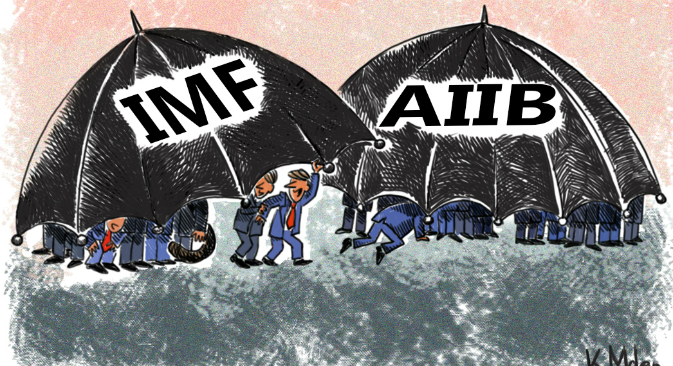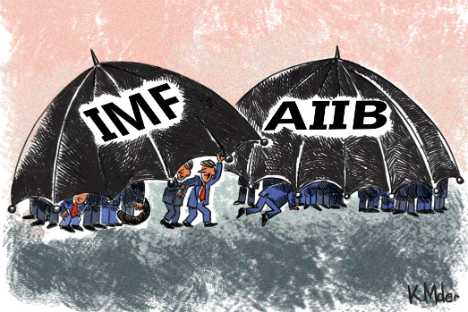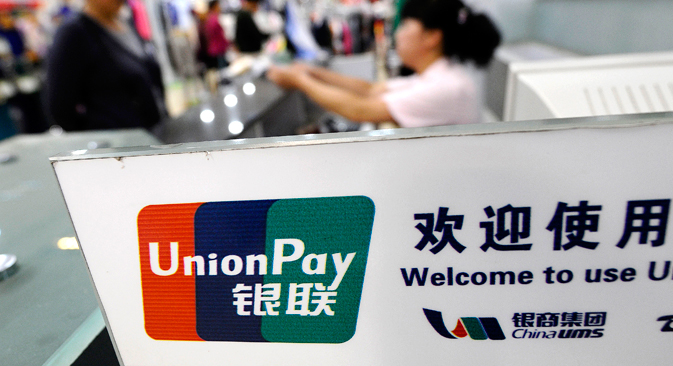China-led Asian Infrastructure Investment Bank faces American resistance

Drawing by Konstantin Maler. Click to enlarge
China’s decision to set up a 100 billion dollars Asian Infrastructure Investment Bank is coming to fruition. Chinese officials claim that at least 35 countries will join the new umbrella financial conglomerate by March 31 deadline. It looks more and more like a watershed event marking a new flexible and sophisticated approach by China to engaging both the developing countries in need of loans to spur their economies and the industrial nations in search of lucrative deals.
American resistance to have its time-honored allies joining the China-led financial structure was expected. It reflects the logic of the zero-sum approach to China’s ascension to global prominence. It is also an indication of the slow erosion of the US grip on global finances. The many billion dollar question is how it would affect Russia’s standing and perspectives. So far, Moscow has opted to remain outside the new alliance. Is that a wise or an unwise stance?
Recent Wars of Sanctions, troubles in various parts of the globe, from the MENA region to Hongkong, coupled with attempts of the United States to bring economic relief to its own citizens by striking a comprehensive trade deal with the European Union, at the expense of the European business and taxpayers, all of this has undermined the credibility of the international dominant financial institutions.
On top of that, the U.S. Congress has shortsightedly prevented China and the emerging economies to have a bigger say in running the International Monetary Fund. This opposition has led to a backlash resulting in an unexpected backing of the Beijing’s promoted Asian Infrastructure Investment Bank.
However, the idea of joining a Chinese bank has triggered off a barrage of criticism from the United States, created a split within the trans-Atlantic alliance, and raised both hopes and fears of ruining the Washington Consensus. Just to remind you, the Washington Consensus represents a packaged prescription for reforms in the thirds World which had been elaborated jointly by the Washington-based institutions such as the International Monetary Fund, World Bank, and the US Treasury Department.
The Asian Infrastructure Investment Bank is designed specifically to source finances to build roads, rail and power projects, and thus presents an alternative to the World Bank and other US-linked financial institutions. It would also compete with a similar loan-provider in Japan, Asian Development Bank (ADB) which used to serve as a major donor for the nations in Asia.
In order to avoid accusations of taking a heavy-handed approach to lending money while lacking transparency, China pledged to take into account different opinions and even granted the participants veto powers.
Beijing’s smart moves created confusion among staunch allies of the United States. Eventually, some of them broke ranks and decided to jump on the band wagon for apparent fear of being left out in the cold. The United Kingdom, Germany, France and Italy applied to join the China-led mega bank. This demonstrative act of desertion infuriated Washington and for quite good reasons. Yet, there can be a different interpretation of the volte-face by the Europeans.
At present, the money markets are dominated by two giants, World Bank and the International Monetary Fund. Both emerged as a product of the Bretton Woods system in 1944 which established the supremacy of the American dollar as the one and only common denominator in the world of finances. This pecking order remained unchallenged until recently when the gradually changing hierarchy of economic powers provoked trade and currency wars.
Money talks, and it seems that money will soon talk with a distinct Chinese accent.
The author is an independent journalist.
All rights reserved by Rossiyskaya Gazeta.
Subscribe
to our newsletter!
Get the week's best stories straight to your inbox

